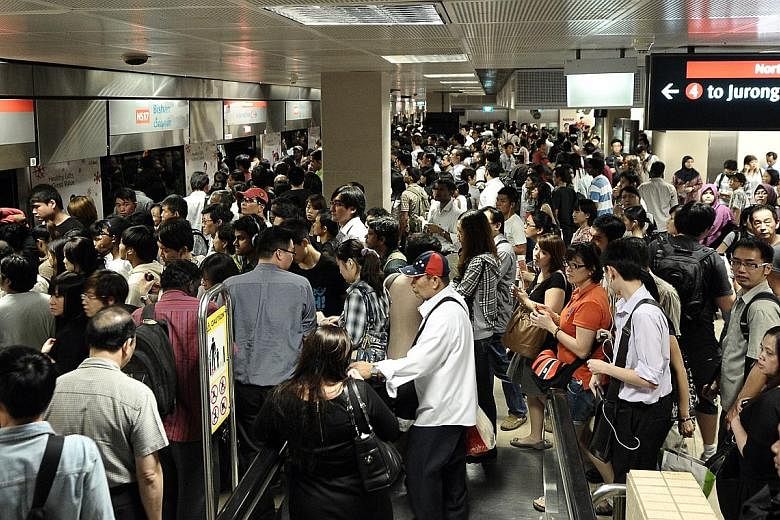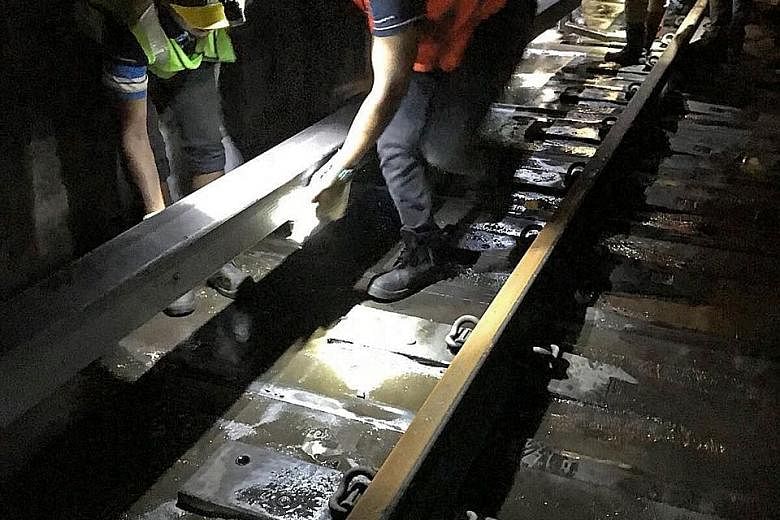It had never happened before. On Oct 7, rainwater flooded an MRT tunnel via an opening near Bishan station, submerging the underground tracks - up to waist level, at the deepest.
The first flooding incident on the rail network crippled a large stretch of the North-South Line for more than 20 hours, and affected 250,000 commuters.
Preliminary investigations pinpointed the culprit as faulty float switches, which control the pump system. They are meant to activate pumps when submerged. Sludge and debris were found to have accumulated in the anti-flood storm water pit in Bishan.
Now commuters are aghast at a new wash of dirty water: In a shocking development last week, SMRT revealed that its staff may have doctored pump and tank-system maintenance records on three occasions.
Investigations found that staff did not get access to the tracks or activate the pumps on the stated maintenance dates - meaning those pumps have not been maintained for about a year.
The unprecedented disruption will take centre stage in Parliament on Tuesday, with 10 MPs from both sides of the House filing a deluge of questions for Transport Minister Khaw Boon Wan to answer.
They are set to ask about the root causes of the flooding, how to prevent a repeat, and whether a Committee of Inquiry (COI) should be called, among other things.
Ahead of the sitting, Insight looks at the possible extent of such lapses, SMRT's maintenance culture, and what needs to be done.
How pervasive is the rot within it?
MP Lim Biow Chuan has one main question he wants answered: Did only one team falsify records, or are there more?
"One team didn't do their part. What is the attitude of the other maintenance teams? Are they really doing their jobs, or just signing off?" asks Mr Lim, who sits on the Government Parliamentary Committee (GPC) for Transport.
Insight understands that an assistant engineer would sign off on records after technicians completed their work. It remains unclear how many levels of management knew about the falsifications, or how widespread the practice is.
Company insiders say the news was received with a mix of shock and betrayal, with staff speculating on why those responsible did it.
A former senior executive from SMRT says, on condition of anonymity: "Obviously, checks have not been done. It's hard for anyone to say this is just an isolated incident - it's probably more pervasive than what was reported."
To urge those who cut corners to own up, SMRT gave its staff an amnesty period till last Friday. It assured them that those who admitted to breaches during that period would not be penalised.
It has since embarked on a massive internal audit - named Operation Osprey - to uncover any other possible lapses. Osprey is the name of a predatory hawk - a sign that the company is determined to hunt down any other potential perpetrators of malpractice.
Insight understands that staff members who admitted to lapses during the amnesty period were from SMRT's building and facilities department, which oversees areas including flood prevention, tunnel ventilation and fire-protection systems.
When asked how many came forward, SMRT said it was unable to comment beyond the statement it had issued earlier.
National University of Singapore (NUS) transport researcher Lee Der Horng wants to know why the existing system of checks failed to detect the lapses, and why the Land Transport Authority (LTA) - which conducts audits on SMRT - did not catch the breaches either.
He also questions why the staff responsible did not do their work.
A senior staff member within SMRT, who requested anonymity as he was not authorised to speak to the media, points to complacency and the difficulty of obtaining track access for maintenance work as possible reasons. He reckons such breaches are confined to pockets of staff who have been with the company for a long time.
The slots for maintenance works were reduced from the middle of last year because of extensive testing conducted for the new signalling system, he says, noting test trains were run during after-service hours for three nights a week.
No work could be done during those periods as the tracks were "live", he adds.
The staff maintaining the pumps also had to compete with other teams for track access, including those replacing the power-supplying third rail and those doing urgent work, like repairing defects on the running rail.
They may have decided to sign off on the maintenance records when they could not get access, banking on the fact they would not get found out as the pump system was reliable and had never failed, says the senior staff member.
"Sometimes complacency sets in, and people take risks. It's upsetting that they took risks so many times," he says. "The last man on the ground not doing his work - it's not something we thought could happen. It's very sad."
Why is the maintenance culture still flawed?
In December 2011, the North-South Line was hit by two massive breakdowns in swift succession.
The severity of those disruptions - the worst the MRT network had seen at the time - prompted the Government to call a high-level COI.
Then SMRT chief executive Saw Phaik Hwa drew flak for focusing on growing the transport operator's retail business, instead of engineering. She resigned in January 2012.
After a six-week inquiry, the COI concluded that SMRT's inadequate maintenance had led to the December disruptions, and flagged shortcomings in its maintenance and monitoring regime.
Since then, SMRT has moved to prioritise maintenance, and embarked on an overhaul of key systems on the ageing North-South and East-West lines that will take up till 2019 to be completed.
It employed former chief of defence force Desmond Kuek as its new CEO in October 2012.
In an interview with this newspaper soon after some of the company's bus drivers from China went on an illegal strike in November 2012, Mr Kuek said: "There are clearly managerial, structural, cultural and systemic issues that need addressing."
SMRT has been grappling with the issue of poor work ethic among some staff for years, says the former SMRT senior executive who spoke to Insight. He cited the security breach at Bishan Depot in 2011, which saw vandals break into the facility and spray-paint graffiti on a train. Staff responsible for checking the train's exterior failed to detect the graffiti before it left the depot.
Insight also spoke to another former SMRT executive, a top-ranking one, who asked not to be named.
He recounts an instance when staff were sacked for failing to grind the train wheels when they were supposed to.
After taking the helm, Mr Kuek moved to transform the company.
He brought in new management, both from the military and the private sector.
Former military men in key posts include SMRT Trains chief Lee Ling Wee, who was head of air engineering and logistics at the Republic of Singapore Air Force, and chief corporate officer Gerard Koh, a colonel in the Singapore Armed Forces (SAF).
SMRT adopted six core values, including service excellence, responsibility and integrity.
The transport operator also appointed a technical advisory panel and hired more engineers and technicians. It says it has beefed up its team of engineers by more than 150 per cent in the last four years, and aims to increase the ranks by another 40 per cent by 2020.
A maintenance operations centre was set up in 2015, to improve its response to disruptions as well as overall maintenance.
Last year, SMRT was privatised to allow it to focus on becoming a commuter-centric transport operator.
Despite these changes, the severity of disruptions has worsened and staff lapses have persisted.
At a press conference last month, after the flooding incident, Mr Kuek said: "Much progress has been made with the inculcation of a positive work culture in the workforce, but there remain some deep-seated cultural issues within the company that has needed more time than anticipated to root out."
He stressed, however, that nine in 10 of SMRT's staff are "incredibly committed, professional and commuter-focused".
So why has the operator been unable to change the cultural mindset of all staff after five years under Mr Kuek's leadership?
The former SMRT senior executive points to cultural differences between the SAF and SMRT.
"You cannot get somebody from Amazon to go over to Google, and change the culture to Amazon's culture," he says. "So it is a big challenge for them."
He also conceded that the senior management during his time did not fix gaps in SMRT's system that allowed workers to get away with lapses.
SMRT has improved its protocols because of its leaders' military background, he notes - adding, however, that the company also needs people with deep knowledge of the rail system to avoid "group-think".
Agreeing, the former top-ranking SMRT executive also cites the loss of staff with institutional knowledge of rail as a factor behind the operator's reliability woes.
The new management lacks the experience to spot and address systemic weaknesses, he says.
NUS' Professor Lee says SMRT has put in a lot of effort to address engineering issues in the past few years, but may have lost sight of management issues.
MP Zaqy Mohamad, a Transport GPC member, calls on SMRT to understand the rationale behind its workers' actions.
He says: "It's easy to point to culture, but they have to relook the root cause of how this came about."
The current SMRT staff member who spoke to Insight says top management is taking the issue very seriously, and adds that many systems have improved under its watch. "But it's always this last thing that we didn't think of that comes back to bite us."
What changes are needed?
SMRT will implement several measures to address its problems, including setting up a Joint Readiness Inspection team that will audit its maintenance work and renewal of rail assets.
It will bring in external experts to inspect critical systems across its network, and intensify training to address lingering cultural issues. When asked to elaborate, the transport operator said it was unable to provide more details.
Its new chairman, Mr Seah Moon Ming, has pledged that all staff accountable for the falsification of records will be sternly disciplined, "regardless of rank and position".
The manager and staff responsible have been suspended and are assisting in investigations, while SMRT also replaced its vice-president of maintenance a week after the flooding.
News of the falsified records has renewed discussion over whether SMRT needs fresh leadership.
In a letter on Friday, Straits Times Forum writer Loh Wengmun wrote:
"The burning question in public minds: What needs to happen before the ministry decides to have a leadership change?"
MP Yee Chia Hsing, who also sits on the Transport GPC, says he can understand why the public is calling for Mr Kuek's dismissal.
The SMRT board will have to decide if he is still the best person available to take the organisation forward, he adds.
PeopleWorldwide Consulting's managing director David Leong reckons Mr Kuek must go.
He says: "Enough damage has been done. The public view of the current management is arguably worse than the previous management (under Ms Saw)."
While there will be transitioning pains, this will be mitigated if the SMRT board finds a new leader experienced with running a rail network, he adds.
Mr Lim Biow Chuan, who is the MP for Mountbatten, however, says he would be "hesitant" to see a change, unless the CEO is truly responsible for the company's problems.
"It's better that the current CEO stays on and solves the problem," he says.
Observers say SMRT's management will have to not only find ways to motivate their maintenance staff, but also conduct more random checks.
They add that the LTA must also be willing to acknowledge any existing design flaws in the rail network if those are uncovered, and work with SMRT to improve them.
The former SMRT senior executive says management has to go to the ground level to make its presence felt.
Insight understands Mr Seah has begun to take a more active role in influencing the company's operations. This includes making several unannounced visits to SMRT staff, including going to the operations control centre at night.
Mr Seah, who is chief executive of liquefied natural gas player Pavilion Energy, is an engineer by training, and was president of ST Electronics when it won contracts to install signalling systems on the Taipei Metro.
SMRT's senior management must talk to all staff, and impress on them the importance of taking responsibility for their actions, Mr Lim says.
"You don't want one bad apple to taint the whole SMRT."




